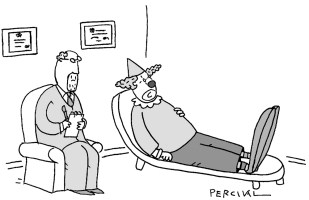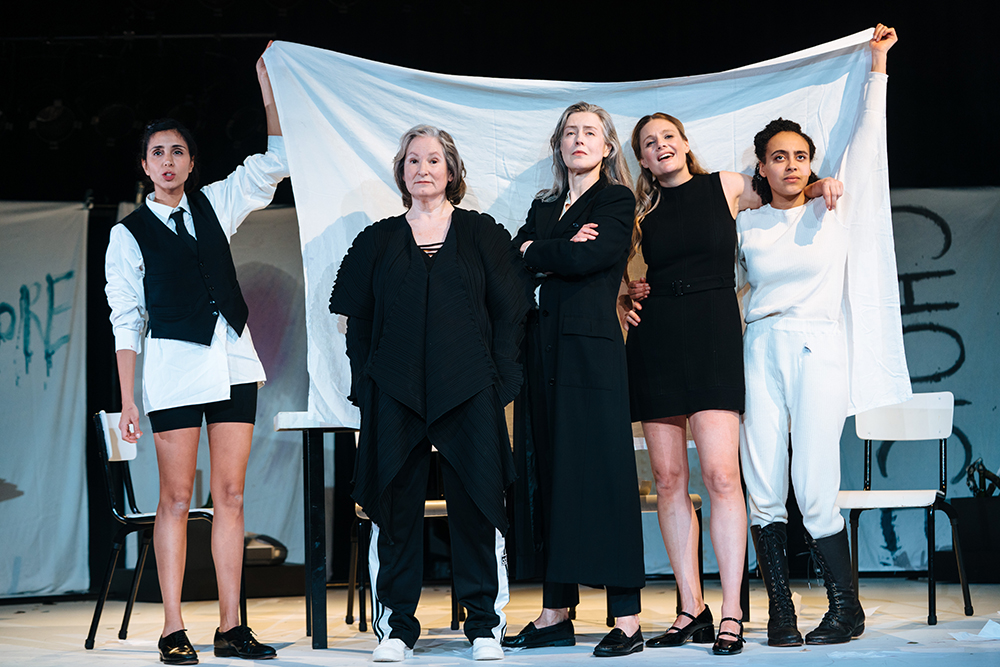
The Years is a monologue spoken by a handful of actresses, some young, some old enough to carry bus passes. They stand in black costumes on a white stage explaining to us the significance of memory, history and feelings. Then the story begins.
The narrator is a precocious chatterbox born in France during the war who has no aim in life other than sensual gratification. She’s not a human being, just a cluster of nerves, like a taste bud, that registers nice or nasty, sweet or bitter. And that’s it. She has no morality. She doesn’t develop personally because her nature isn’t capable of emotional growth. Yet the audience is expected to admire everything she says about her experiences.
Sex is her obsession. As a teen, she brings herself to orgasm on the corner of a table. Later she buffs herself vigorously with a sock. At summer camp, she has sex on a bench with a boy she met 60 seconds earlier. Their pornographic intimacies are mimed in full. They start in the missionary position and they proceed to oral sex. His climax is replicated on stage for our enjoyment.
At university, a casual fling leads to a pregnancy that she tries to terminate with two knitting needles. This fails. So she hires a retired nurse to execute the child inside her womb. The baby’s due date, July 1964, is mentioned in the script. Plenty of people in the audience were born during the 1960s so this aborted foetus could have been any of us. Luckily our parents weren’t child killers. The actress uses lashings of ketchup as she mimes pulling the dead child out of her birth canal. She looks at it and notes its resemblance to a doll. (At this point, someone fainted and was carted out.) The mutilated baby is flushed into the sewers and the narrator continues drifting though the radical 1960s.
More things happen. Fridges appear. So do transistors. She explains how they work. Revolutions start. Wars break out. She explains them too, as if they were fridges and transistors. Nothing interests her. She’s incapable of interpreting events or raising them to the level of art. Her witter can barely even be considered a historical record. It’s just a list of things. The author must have the brains of a sardine. Perhaps that’s unfair. The brains of a headless sardine.

She gets married, raises two thick nasty kids and pursues a teaching career that she hates. In the 1980s, Aids arrives and she divorces her husband. After this she returns to masturbation more or less full time. In bed at night, she finds the ululations of mating neighbours irresistibly stimulating. When not kneading her genitals with a spatula, she humps her way through a queue of eager young bucks who lust after Botoxed women in their sixties. Is any of this true? It sounds like a tragic yarn invented by a Marxist granny to impress the woke nurses at a care home.
The staging is shoddy and informal as if the show were being done in a scout hut. Boxes of props lie here and there. The actresses stand around smiling at each other as they take turns to play the prattling dimwit. None of them can sing but three of them try. Had no one the heart to tell them? The English translation seems to bear imperfections. The phrase ‘secret nostalgia’ is used when ‘perverse nostalgia’ is meant. The ‘iron curtain’ (‘rideau de fer’ in French) comes out as ‘iron wall’. And the actresses struggle to pronounce words such as ‘bourgeois’ and ‘Louvre’. If you have two hours to spare, spend it anywhere but here.
Antigone [on strike] is an interactive political show that wants to cram too much into 90 minutes. The central character is a jihadi bride, evidently based on Shamima Begum, who joins Isis but ends up living in a refugee camp. She wants to reclaim her cancelled UK citizenship and return to England. The show handles this fascinating topic with commendable frankness. Shamima Begum, of course, is an ancient English archetype. She’s a crusader who left these shores to fight a religious war in the Middle East. But, unlike the crusaders, she reacted to defeat by switching sides and joining the cause of western liberalism that she had previously opposed.
Not everyone finds her conversion persuasive. During the show the spectators get the chance to express their views by casting electronic votes. Should the jihadi bride return to Britain? Most answered yes. Do we think our research is more valuable than the opinions of experts? Most answered no. This is a novel and interesting approach to political theatre but the show is confused by a romantic subplot involving the home secretary and his son’s affair with the jihadi bride’s sister. That doesn’t belong here. With less clutter, this show could work well.








Comments